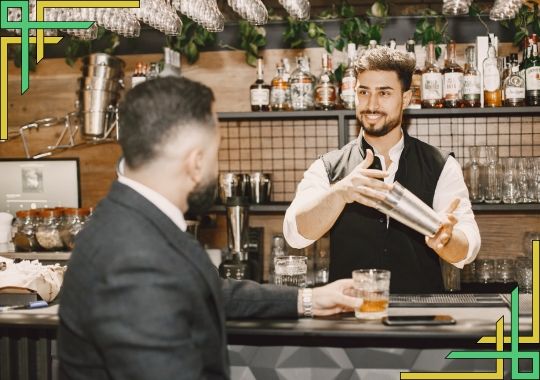No matter what type of establishment you're working in, bar-tending is a unique and varied job. From crafting specialty drinks to ensuring that customers are served promptly and professionally, bartenders must possess many abilities. Whether you're just starting or have been in the business for years, mastering the basics of bartending can make all the difference in providing exceptional service to your guests.
As Amazon affiliates we may earn a commission if you purchase a product at no cost to you.
What do bartenders do?
Bartenders are responsible for providing drinks and services to patrons in the bar or restaurant. Their duties include greeting customers, taking orders, making drinks according to specifications, maintaining a stock of liquor and beer, serving food items such as sandwiches and snacks, keeping track of customer tabs, cleaning up spills and messes, handling money transactions, and closing out cash drawers at the end of their shift.
To ensure customers enjoy a pleasant experience, bartenders must also be knowledgeable in providing excellent customer service. They should maintain a friendly and professional attitude toward patrons, listen attentively to their requests and strive to meet their needs.

Bartender Duties and Responsibilities
Customer Service
Bartenders must provide exceptional customer service throughout their shifts. This includes greeting customers with a friendly smile, listening to their order requests, and ensuring that all drinks are made according to specifications. They should also check in periodically with customers to ensure they are satisfied with the quality of their drink and overall experience. Bartenders should be attentive to all guests and remain professional in any situation. They must also be able to handle complaints or questions politely and take appropriate action to resolve the issue.
Creating Signature Cocktails
Bartenders are responsible for creating signature cocktails for their bar or restaurant. They must be able to develop creative recipes and mixes that will appeal to customers. This involves researching and experimenting with different ingredients to create a unique taste. Bartenders must also use their knowledge of liquors, liqueurs, and other alcoholic beverages to create interesting drinks that add value to the bar’s menu.
Knowing the Classics
They must be knowledgeable about classic cocktails, beer, wine, spirits, and other drink options. Good bartenders will also know how to adjust recipes for taste or liquor availability. Bartenders should know how to operate all bar equipment, including blenders, liquor taps, and refrigeration units.
They must maintain a clean work area, restock bar items as needed and provide excellent customer service. This includes taking customer orders, mixing drinks according to recipes, and providing helpful recommendations when requested.
Making & Serving Drinks
The primary role of a bartender is to mix and serve alcoholic and non-alcoholic drinks for customers. This includes making cocktails, beer, wine, spirits, coffee-based drinks, smoothies, shakes, and more. Bartenders must know the different types of beverages served at their establishment to accurately serve mixed drinks upon request. It is also up to the bartender to follow proper state and local laws when serving alcohol. Bartenders must maintain an organized and clean workspace and handle any customer needs or requests that arise during their shifts.
Being Flexible
Bartenders must possess a great deal of flexibility to serve customers efficiently. This includes the ability to multitask and switch between tasks quickly, such as attending to multiple customers at once or taking drink orders and then quickly preparing them for service. They must also be flexible regarding working hours, often working nights and weekends with shorter breaks than other occupations.
Bartenders must also be flexible regarding their environment and the customers they serve. They should be able to adapt quickly to changing situations, such as large rush periods or difficult customers, to ensure that all customers receive a pleasant experience.
Filling Drink Orders
Bartenders are responsible for taking orders from customers and providing them with various drinks. They must be knowledgeable about different types of alcoholic beverages and mixers and non-alcoholic options. Bartenders should also be able to make suggestions and recommendations based on customer preferences or moods. They must ensure all orders are correct and served quickly and efficiently. Bartenders must also be aware of any dietary restrictions or allergies customers may have when making drinks so that they can make the appropriate substitutions.
Keeping the Bar Area Clean
Bartenders are responsible for keeping the bar area and its surroundings clean. This includes stocking beer, liquor, glasses, ice, mixers, and other supplies like bar inventory and wiping down surfaces throughout their shift. Bartenders also clear away used glasses, straws, and napkins from tables. They must also ensure that floors are free of spills or debris throughout their shift. You can check the bartender job description sample to validate these.

Skills of a Bartender
To effectively and efficiently fulfill their duties, bartenders should have certain skills. These include:
- Knowledge and understanding of alcoholic beverages, beer types, cocktail recipes, garnishes, glassware, and food pairings.
- Attention to detail in creating drinks accurately according to customer specifications.
- Ability to multitask while taking orders, making drinks, and utilizing the POS system.
- Excellent customer service skills, including active listening and problem-solving.
- Ability to work well in a fast-paced environment while managing stress.
- Knowledge of responsible alcohol service laws and regulations.
- Cash handling and recordkeeping abilities.
Recommended Article

Frequently Asked Questions FAQs
What is the most important role of a bartender?
The most important role of a bartender is to provide excellent customer service. As the face of the bar, bartenders are responsible for engaging guests, taking orders, mixing drinks, and ensuring that all guests have an enjoyable experience. A good bartender should know about beer and wine service methods and regulations to ensure customers' safety.
How do I write a bartender's CV?
Writing a great bartender's CV or resume is essential to landing the bartender job description you want. You should include skills and experiences demonstrating your ability to serve customers and make drinks quickly and accurately. It would be best if you also considered including some of the following sections in your CV:
Objective – A brief statement about your career goals as a bartender.
Education – List any relevant certifications or degrees you have.
Experience – Include any previous bartending jobs and any other hospitality or customer service positions that may be applicable.
Skills – Showcase your unique skills, such as making specialty cocktails, memorizing drink orders quickly, or handling difficult customers.
Accomplishments – Highlight any awards, recognitions, or special projects you have handled in the past.
Finally, make sure your CV is up-to-date, well-organized, and error-free!
What should a beginner bartender know?
A beginner bartender should understand the basics of mixing drinks and should also have an understanding of customer service, basic food safety principles, and appropriate pouring techniques. They should also be able to handle cash transactions, keep track of inventory, and work in a fast-paced environment. It would benefit them to know how to use a point-of-sale system, and they should also be knowledgeable about local, state, and federal regulations. They should be familiar with the different types of liquor, beer, and wine available and the appropriate serving temperatures for those beverages.
Conclusion
Basic bartender skills and duties encompass a blend of technical proficiency, customer service excellence, and operational efficiency. Key skills include mixing and serving a variety of drinks, understanding and adhering to safety and hygiene standards, and managing inventory. Duties extend beyond drink preparation to include maintaining a clean and organized bar, providing a welcoming atmosphere, and ensuring customer satisfaction.










